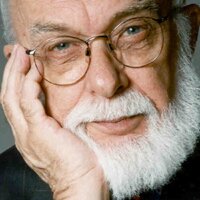Not all bets are off on the paranormal

James Randi
The first part is true: as of March 6, 2010 Randi will close the million-dollar challenge to psychics to prove they have paranormal powers under proper observing conditions. In his SWIFT newsletter for January 4, 2008, Randi notes, “While the JREF earns a certain income from having the prize money very conservatively invested, that sum could certainly be used more productively if it were made freely available to us.” He adds, “Ten years is long enough to wait. The hundreds of poorly-constructed applications, and the endless hours of phone, e-mail, and in-person discussions we’ve had to suffer through, will be things of the past, for us at the JREF.” (You can read the rest for yourself.)
Most of the applicants he had to deal with were deluded amateurs; the professionals stayed away in droves. I find this unsurprising, for two reasons. First, although relatively few big-name professionals make millions, they’re probably making a good enough living not to want to risk the kind of publicity they’d get from taking up Randi’s challenge. Second, speaking as a former full-time performer myself, someone who routinely performs in front of thousands of people has to know he can reliably deliver a good show, and therefore has to have full command of whatever techniques he’s using. I would logically expect conscious frauds to form a higher percentage of successful stage performers than of small-timers who largely deal with people one-on-one. The smart conscious fraud would not want to hand Randi the opportunity to expose him.
For skeptics, though, it’s the end of an era. The million-dollar challenge was only ten years old, but its predecessor was a $10,000 challenge that went for something like 35 years. When Randi set up the James Randi Educational Foundation, he began accepting pledges to increase the prize, and then eventually set up the million-dollar trust fund. Commenters to the BoingBoing blog, which posted the news shortly after Randi released it, suggested that a much bigger prize could be offered via an insurance policy, but, as another commenter pointed out, that would just attract more kooks and greater demands on Randi’s finite time and energy.
There are plenty of psychics who claim they’ve been tested by scientists and passed, but what Randi brought to the situation was a lot of experience, a lot of experts in various fields that he could call, and the right kind of magical thinking. I mean, he thinks like a magician, not that he thinks fantasies will come true.
Randi was my original inspiration to get involved with the skeptics: he did a lecture/demonstration at Cornell in 1982 that amazed me because he was able to explain woolly stuff I’d been hearing for years around the folk scene. What really sealed the deal was mathematical games writer Martin Gardner’s books on the subject; I’d known Gardner’s work for years, ever since my high school math teacher had talked about him. It was only later that I learned that Gardner, like Randi, had a background in magic; to go with his mathematical games and skeptical books, Gardner has published a number of well-regarded books on magic.
Magicians make the best skeptics because they are experts on diverting attention. The best of them have the cleverness of Hollywood stunt people in devising tricks and stratagems for making the impossible seem real. They are good at designing things and building things, too. As stage performers, they are experts at capturing the audience’s vision. And so when the magician says, “Pick a card, any card,” somehow you always pick the card the magician intended you to take (as Bernard Woolley observed in Yes, Minister). And when the scarf disappears into the left hand and reappears in the right, the magician’s performing ability ensures that you don’t notice the moment it changes hands. Learning to dissect what you see, to look in the direction the magician is trying to divert you from, to think how someone would do a trick, and to plot a stratagem to make the trick impossible – those are skills few scientists have.
The great thing about the challenge was that the rest of us could say to someone who was deeply impressed with his own abilities, “If you’re so psychic, why aren’t you going for Randi’s prize?” We could trust that if Randi mounted a test it would be a good, well-designed test that eliminated the possibility of fraud. And we could trust that anyone who ever won the money would really damn well be able to produce those paranormal powers.
I can’t blame Randi for wanting to hang up his check book after so many years, but I will miss knowing that challenge is there.
Oh, and to answer the poster’s question: “James Randi” isn’t exactly the name Randi was born with. He adopted it as his stage name when he was a teenager. I think he’s been using it long enough for it to be real.
Wendy M Grossman is founder and former editor (twice) of The Skeptic magazine.
 Email This Post
Email This Post 



[...] Article on Randi and the history and power of the Million Dollar Challenge over at The Philosophers’ Magazine. [...]